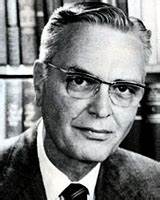On this date the psychologist, writer and gay historian C.A. TRIPP was born (d. 2003). Born Clarence Arthur Tripp in Denton, Texas, Tripp studied at the Rochester Institute of Technology, and was a Naval Veteran. Tripp worked with Alfred Kinsey at the Kinsey Institute for Research in Sex, Gender and Reproduction in Bloomington, Indiana from 1948 to 1956. He earned a Ph.D. in Clinical psychology from New York University.
Tripp originally intended to spend his life as a photographer. Born in Denton, TX, he left home to master the art and science of photography at the Kodak Institute in Rochester, NY, and earned money taking headshots and promotional photos for the theater industry. In 1948, however, this path branched away when he was hired as a photographer by the Kinsey Institute for Sex Research. Here, he was introduced to the field of psychology and became intrigued with Kinsey’s study of sex.
Dr. Alfred Kinsey, the director of the institute, eventually sponsored Tripp’s application to New York University, where he earned a Ph.D. in psychology. After earning his degree, Dr. Tripp taught at the SUNY Downstate Medical Center, he left to start a private psychotherapy practice and pursue his own independent research into the origins and variations of human sexuality.
After ten years, his research culminated in The Homosexual Matrix, a groundbreaking book that was among the first scholarly works to deal with homosexuality from a scientific perspective, relatively free from bias or moralizing. The huge success of The Homosexual Matrix brought Dr. Tripp on speaking tours across the country as well as on radio and television, but he continued to practice clinical psychology in his New York City office as well as at his home in Nyack, NY.
Although his book The Homosexual Matrix was an early classic for many gay men seeking information, he is best known for his book The Intimate World of Abraham Lincoln, which was published posthumously.
In the book Tripp details the evidence for Lincoln’s attachments and sexual relationships with men throughout his life. It’s a powerful book that Tripp devoted the last decades of his life to writing. It caused an understandable firestorm but also contributed greatly to the scholarship of the beloved president that had been ensconced in heterosexual wax of hagiography. A pretty interesting read all around.
